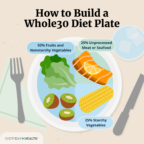In recent years, the gluten-free diet has surged in popularity, not just among individuals with celiac disease or gluten intolerance but also among the general public. With an increasing number of gluten-free food products lining store shelves and celebrities endorsing the lifestyle, one might wonder whether the gluten-free trend is a necessary health intervention or merely a passing fad. This article delves into the scientific evidence behind gluten-free diets, explores their health implications, and evaluates whether they are essential for well-being or overhyped.
What is Gluten and Why Avoid It?
Gluten is a group of proteins found in wheat, barley, rye, and related grains. It plays a critical role in giving dough its elasticity and helps bread rise. For most people, consuming gluten is entirely safe and poses no harm. However, in certain individuals, gluten can trigger adverse reactions ranging from mild discomfort to severe medical conditions.
Who Needs a Gluten-Free Diet?
1. Celiac Disease
Celiac disease is a chronic autoimmune disorder in which the ingestion of gluten leads to damage in the small intestine. For individuals with celiac disease, consuming even tiny amounts of gluten can cause an immune response that damages the villi (tiny hair-like structures) in the small intestine. This impairs nutrient absorption and can lead to a variety of symptoms such as diarrhea, abdominal pain, fatigue, and long-term complications like malnutrition, infertility, and osteoporosis.
The only known treatment for celiac disease is a strict, lifelong gluten-free diet. Therefore, for individuals diagnosed with celiac disease, a gluten-free diet is not just beneficial but necessary for managing the condition and preventing long-term health complications.
2. Non-Celiac Gluten Sensitivity
Non-celiac gluten sensitivity (NCGS) is another condition where individuals experience symptoms similar to those of celiac disease, such as bloating, fatigue, and abdominal discomfort, after consuming gluten. However, unlike celiac disease, NCGS does not cause immune system damage or harm to the intestines. The exact mechanism of NCGS remains unclear, and diagnosis is often one of exclusion (i.e., after ruling out other potential causes).
For individuals with NCGS, a gluten-free diet may provide relief from symptoms, though the long-term benefits and risks are still a topic of ongoing research.
3. Wheat Allergy
Wheat allergy, though distinct from celiac disease and NCGS, is another condition in which individuals must avoid gluten-containing foods. An allergic reaction to wheat can cause symptoms ranging from mild (rashes, itching, swelling) to severe (anaphylaxis). A gluten-free diet is often recommended for those with wheat allergies, but the avoidance of wheat in this case is due to the immune system’s response to the proteins in wheat, not specifically gluten.
The Gluten-Free Trend: More Than Just a Medical Necessity?
While the gluten-free diet is critical for those with medical conditions like celiac disease, NCGS, and wheat allergy, the question remains: is it necessary for individuals without these conditions? The rising popularity of gluten-free diets has been fueled by anecdotal claims of increased energy, improved digestion, and enhanced overall health. But does scientific evidence support these claims for the general population?
1. Potential Health Benefits of a Gluten-Free Diet
For individuals without gluten-related disorders, adopting a gluten-free diet does not appear to offer significant health benefits. In fact, many gluten-free processed foods are lower in fiber and other nutrients, which could negatively impact health if they are not replaced with whole, nutritious alternatives. Furthermore, gluten-free diets often lead to higher consumption of sugar, fat, and refined grains to make up for the absence of gluten-containing ingredients, potentially contributing to weight gain and other health concerns.
That being said, some people report feeling better on a gluten-free diet, which may be due to eliminating processed foods or other dietary changes that come along with cutting gluten. This could be particularly true for individuals with undiagnosed food sensitivities or those replacing less nutritious gluten-rich foods with healthier alternatives.
2. The Potential Risks of a Gluten-Free Diet
Despite the perceived benefits, there are potential risks to adopting a gluten-free diet without a medical need. One of the primary concerns is nutrient deficiency. Many gluten-free foods are lacking in essential nutrients like fiber, B vitamins, and iron. Gluten-containing whole grains such as wheat, barley, and rye are rich sources of these nutrients. Therefore, when individuals eliminate gluten from their diets, they must be mindful of replacing these nutrients through other food sources or supplements.
In addition, the cost of gluten-free products can be significantly higher than their gluten-containing counterparts, which can lead to an increased financial burden without any proven health benefits for those without a gluten-related disorder.
3. Psychological Effects and Social Considerations
The social and psychological aspects of adopting a gluten-free diet also cannot be overlooked. While some individuals report feeling empowered by their choice to go gluten-free, others may experience anxiety or social isolation, particularly when dining out or attending social gatherings. The challenge of maintaining a gluten-free diet in a world where gluten is prevalent can be stressful, leading to unnecessary feelings of deprivation or restriction.
Is the Gluten-Free Diet Overhyped?
For most healthy individuals, a gluten-free diet is not necessary and may even be counterproductive if not carefully managed. The overwhelming majority of people can consume gluten without issue and benefit from the nutrients provided by gluten-containing foods. However, in cases of celiac disease, non-celiac gluten sensitivity, or wheat allergy, a gluten-free diet is essential for maintaining health and preventing long-term complications.
The rise of the gluten-free trend among the general public can largely be attributed to a combination of celebrity endorsements, marketing, and anecdotal success stories. While some individuals may feel better on a gluten-free diet, these benefits are often linked to broader changes in lifestyle or dietary habits, rather than the elimination of gluten itself.
Conclusion: Necessary or Overhyped?
In conclusion, gluten-free diets are not inherently necessary for most people and should not be viewed as a panacea for health. For individuals with gluten-related disorders, however, a gluten-free diet is crucial for managing symptoms and preventing serious health complications. For the general population, the decision to adopt a gluten-free lifestyle should be informed by individual health needs and preferences, rather than driven by popular trends or marketing claims.
If you suspect gluten might be causing health issues, it is important to consult with a healthcare professional for appropriate testing and diagnosis. Ultimately, the key to a healthy diet lies in balance, variety, and the consumption of whole, minimally processed foods—whether they contain gluten or not.































